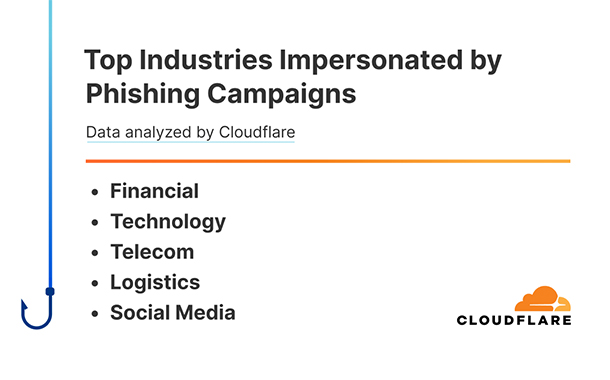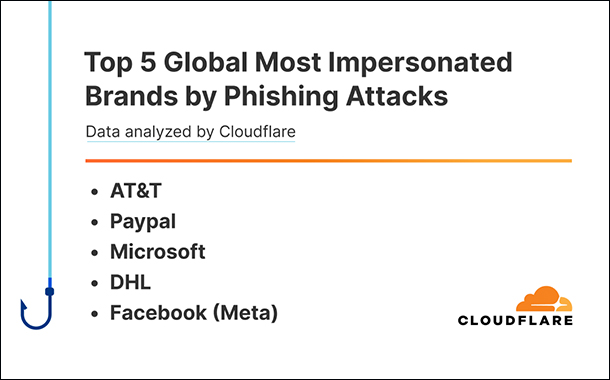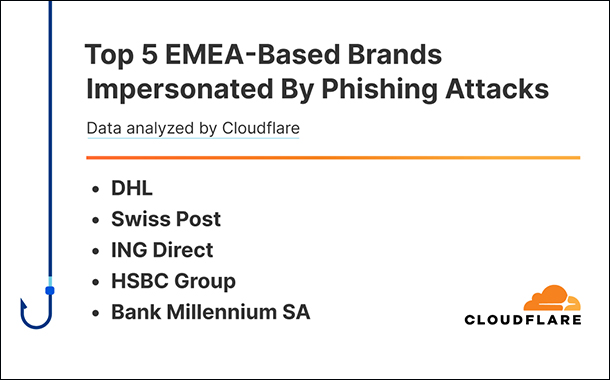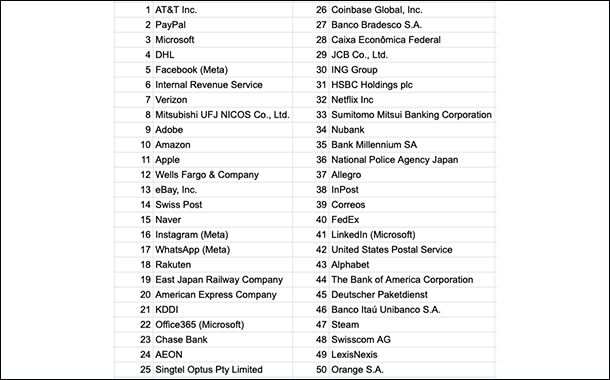Cloudflare, published a global report on the Top 50 Brands Used in Phishing Attacks. Nearly 20% of all websites are protected by Cloudflare’s global network and its email security offering stopped 2.3 billion unwanted emails from hitting inboxes in 2022. As a result, Cloudflare’s machine learning and data analysis give it unique insight into the phishing domains most frequently clicked on by Internet users and the ability to proactively protect its Zero Trust customers.
“Phishing” refers to an attempt to steal sensitive information like usernames, passwords, credit card numbers, bank and crypto account information, or other important data in order to utilize or sell the stolen information. Today, phishing is the fastest growing Internet crime, and a threat to both consumers and businesses. By masquerading as a reputable source – sometimes with an enticing request, other times with a severe consequence – an attacker lures in the victim in order to trick them, similarly to how a fisherman uses bait to catch a fish. Oftentimes, these attempts come in the form of an email, text message, or mistyped website URL that looks like it’s from a well-known brand, but is actually a malicious party.

“Phishing attacks prey on our trust in the brands we love and use everyday, and are becoming more difficult to spot for even the most digitally-savvy person. Our sanity, bank accounts, and passwords shouldn’t be compromised because we glossed over a misspelled ‘from’ field or accidentally clicked on an obscure URL,” said Matthew Prince, co-founder and CEO, Cloudflare. “We’ve extended our Zero Trust services with real-time protection against new phishing sites, so our customers won’t fall victim to attacks leveraging the brands they trust.”

Most Impersonated Brand of 2022: AT&T Inc. The top 50 brands most commonly impersonated by phishing URLs are:
Cloudflare found that finance, technology, and telecom brands were the most commonly impersonated industries, notably for the unprecedented access and financial benefit that bank accounts, email and social media, and phone companies can give attackers. Technology and telecom companies are a unique threat because phishing attacks can intercept the emails and text messages that are used to verify a user’s identity via two-factor authentication. Therefore, these phishing attempts can lead to other accounts being compromised as well.

The top 50 brands we found, along with the most commonly used domain for phishing those brands can be found on Cloudflare’s blog.
New Anti-Phishing Protections with Cloudflare One Today, Cloudflare also announced new capabilities to provide customers the most comprehensive and effective phishing protection available. Building on Cloudflare Area1’s recent launch of advanced Zero Trust email security tools, customers can now automatically and immediately identify and block “confusable” domains to better protect their corporate networks. This offering can help protect against phishing attacks similar to the one that threatened Cloudflare and 100 other companies last summer, when attackers created the misleading “cloudflare-okta.com” domain just 40 minutes before sending it to employees. Using Cloudflare Gateway, customers can create zero trust rules that prevent their employees from resolving or browsing to these “confusable” or lookalike domains.
Report Methodology To generate the report, Cloudflare used 1.1.1.1 DNS resolver resolution data to find the domains associated with phishing URLs that were most commonly clicked. All domains that are used for shared services (like hosting sites Google, Amazon, and GoDaddy) that could not be verified as a phishing attempt were removed from the data set.



















